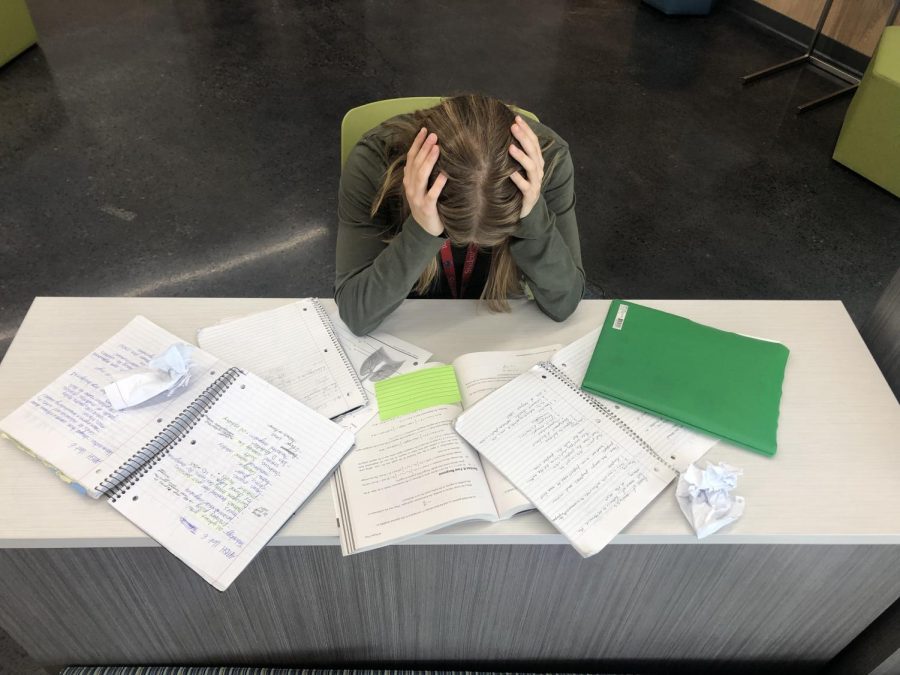Running on empty
The challenges faced by gifted students in school
Photo by Sashrika Shyam
Students get overwhelmed with the increasing amount of pressure placed on them as gifted kids.
I was first labeled as a “gifted kid” in second grade. That label has followed me throughout middle school and has grown to become a defining part of my character. However, I no longer identify with this label.
Throughout my years in school I have been in the “gifted” classes. Up until middle school, I thought that this was because I was smarter because that is what I was taught to believe. I first saw this term in a negative light in sixth grade, where there was talk of changing the name of our gifted program because it made other kids in the “standard” classes feel bad.
Many teachers I had worked to remove this stigma, teaching us that we weren’t smarter, we simply learned faster. It was this belief that propelled me to take my first AP class as a freshman.
I believed that because I supposedly learned faster, I would be successful in this class. This was not the case at all. I discovered that I needed to manage my time, I needed to put in more effort than I was used to, and I needed to go above and beyond in order to succeed.
I was not used to struggling with school work. I was accustomed to just doing my work and getting the grades I desired. I watched more and more of my peers get ahead, as I slowly fell behind. I started lacking motivation to do my work because I was so discouraged.
It hurt to watch my grades drop. As they did, every assignment felt like a huge deal, I felt like the stakes were higher. However, that added pressure only caused me to put off my work because I was so overwhelmed.
Apparently, I was not alone. Many have labeled this as “gifted kid burnout” on various social media platforms. It has been collectively decided that this term describes people who were considered to be “gifted” taking on a heavy workload to live up to these expectations, but then getting overwhelmed and burnt out.
Sydney Pine, junior, believes that she embodies this burnout, after her experience throughout her years in school.
“I was in the gifted program throughout elementary school and middle school,” Pine said. “To me, the term gifted means to understand subjects faster or earlier than most people, which were traits I exhibited when I was younger.”
However, Pine believes that these are not the same traits she has in school currently, describing herself as a “former gifted student“.
“I consider myself to be less gifted than I was as a child because I find myself taking longer to understand things that used to come easy to me,” Pine said. “I feel like I have significantly less motivation than I used to have as a kid.”
I attribute my loss of motivation to my experience in preparing for college, especially when taking standardized tests.
I have taken the SAT three times now, and the amount of studying I put in caused me to burn out very quickly this year. I spent my summer studying for this test, so by the time I got to school and classwork started picking up, I felt very drained.
Pine believes that her burnout was a result of the COVID-19 pandemic during her freshman year.
“I think what caused [me to become burnt out] was trying to motivate myself to do my schoolwork during the pandemic two years ago because eLearning was very draining for me,” Pine said. “I spent my entire freshman year online so it was very difficult to make new friends until I was able to return to school in person.”
Similarly to Pine, Justine Repplinger, math teacher, says she has commonly seen motivation diminish in students throughout their years in high school as a result of the pandemic.
“I think that a lot of my AP students still missed a good chunk of their foundational learning in math, and so it was really easy to be unmotivated,” Repplinger said. “I think success breeds success, but struggle does not. Sometimes students will overcome the struggle and sometimes they give in to the struggle by giving up.”
Repplinger also believes that in addition to the pandemic, the higher expectations on students has led to a rise of cheating as a result of burning out.
“I think some people cheat because they feel the stress and the pressure of always having to succeed,” Repplinger said. “I want to teach my students that life is full of failure and successes, and we have to be more accepting of that and realize that failure is never permanent.”
In a study done by the Educational Testing Service, it was found that between 75% to 98% of college students surveyed said they cheated in high school. The study also found that the increased emphasis on grades has led to the increased motivation for cheating.
More than the pressure to cheat, I have found that the pressure I place on myself has been the most debilitating. Whenever I am unable to handle the high workload I have taken on, I get down on myself very easily. The stereotypes of the need for “gifted kids” to be perfect and smart all the time has led to me burning out faster, as I constantly feel a weight on my shoulders to do better.
Pine also believes that there are many negative stereotypes surrounding the term gifted that has led to her burnout.
“I feel like gifted kids are stereotyped as loving school and doing schoolwork for fun, but I disagree with that personally,” Pine said. “Even as a child I did not enjoy doing schoolwork, but I was motivated by the fact that I was good at it.”
The motivation of being good at schoolwork pushed me through elementary school and middle school. But as classes got harder in high school, I lost that motivation. On top of struggling with a lack of drive, I felt bad about not being as invested in school, due to these stereotypes of how I was “supposed” to be as a gifted kid.
The pressures placed on gifted kids at a young age all culminate in high school, leading to this increased feeling of burnout. Repplinger believes that there are still ways to avoid this in high school.
“I think consistency and effort over time is the way to be successful in anything that you do,” Repplinger said. “[School] often gets a little bit overwhelming. I think if you pace yourself, in the long run, you win the race.”

During her third and final year on the Bear Facts staff, Sashrika is looking forward to assuming her role as LZ Life Editor and Social Media Manager. When...

